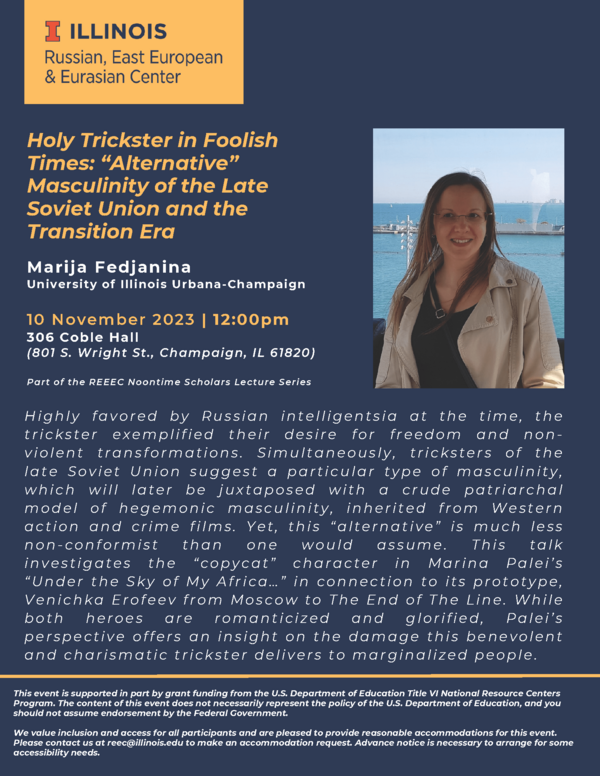
REEEC Noontime Scholars Lecture: Marija Fedjanina, "Holy Trickster in Foolish Times: 'Alternative' Masculinity of the Late Soviet Union and the Transition Era"
- Event Type
- Lecture
- Sponsor
- REEEC
- Location
- 306 Coble Hall (801 S. Wright St., Champaign, IL 61820)
- Date
- Nov 10, 2023 12:00 pm
- Speaker
- Marija Fedjanina (PhD Candidate in Slavic Languages & Literatures, University of Illinois Urbana-Champaign)
- Cost
- Free and open to the public.
- Contact
- REEEC
- reec@illinois.edu
- Views
- 247
- Originating Calendar
- Russian, E. European & Eurasian Center: Speakers
Highly favored by Russian intelligentsia at the time, the trickster exemplified their desire for freedom and non-violent transformations. Simultaneously, tricksters of the late Soviet Union suggest a particular type of masculinity, which will later be juxtaposed with a crude patriarchal model of hegemonic masculinity, inherited from Western action and crime films. Yet, this “alternative” is much less non-conformist than one would assume. This talk investigates the “copycat” character in Marina Palei’s “Under the Sky of My Africa…” in connection to its prototype, Venichka Erofeev from Moscow to The End of The Line. While both heroes are romanticized and glorified, Palei’s perspective offers an insight on the damage this benevolent and charismatic trickster delivers to marginalized people.
Marija Fedjanina is a PhD candidate at the Department of Slavic Languages and Literatures. Her primary focus is Russian postmodernism, gender and postcolonial theory. Her dissertation, titled “If There’s No Party, Everything Is Permitted: Reification of Western Theories in Russian post-Soviet Literature” investigates the intercultural borrowing from the West during the process of Russian identity (re)construction in post-Soviet period, and the way Russian postmodernist authors challenged them in Dostoevsky-style “argumentative poetics.”